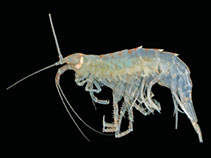Oradarea megalops (Nicholls, 1938)
| Native range | All suitable habitat | Point map | Year 2050 |

|
| This map was computer-generated and has not yet been reviewed. |
| Oradarea megalops AquaMaps Data sources: GBIF OBIS |
Classification / Names Common names | Synonyms | CoL | ITIS | WoRMS
Malacostraca | Amphipoda | Calliopiidae
Environment: milieu / climate zone / depth range / distribution range Ecology
Benthic; depth range 81 - 385 m (Ref. 84663). Polar
Distribution Countries | FAO areas | Ecosystems | Occurrences | Introductions
Southern Ocean: East Antarctic Province.
Length at first maturity / Size / Weight / Age
Maturity: Lm ? range ? - ? cm
Life cycle and mating behavior Maturity | Reproduction | Spawning | Eggs | Fecundity | Larvae
Main reference
References | Coordinator | Collaborators
De Broyer, C., J.K. Lowry, K. Jazdzewski and H. Robert 2007 Catalogue of the Gammaridean and Corophiidean Amphipoda (Crustacea) of the Southern Ocean, with distribution and ecological data. In C. De Broyer (ed.), Census of Antarctic Marine Life: Synopsis of the Amphipoda of the Southern Ocean. Vol. I. Bulletin de l'Institut royal des Sciences naturelles de Belgique van het koninklijk Belgisch Instituut voor Natuurwetenschappen. Biologie 77(suppl.1):1-325. (Ref. 84663)
IUCN Red List Status
(Ref. 130435: Version 2025-1)
CITES status (Ref. 108899)
CMS (Ref. 116361)
Threat to humans
Human uses
| FishSource |
Tools
More information
Diet composition
Food consumption
Predators
Max. ages / sizes
Length-weight rel.
Length-length rel.
Length-frequencies
Mass conversion
Abundance
Internet sources
BHL | BOLD Systems | CISTI | DiscoverLife | FAO(Publication : search) | Fishipedia | GenBank (genome, nucleotide) | GloBI | Gomexsi | Google Books | Google Scholar | Google | PubMed | Tree of Life | Wikipedia (Go, Search) | Zoological Record



